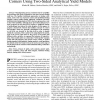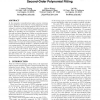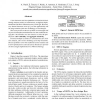150
click to vote
TCAD
2008
15 years 1 months ago
2008
Manufacturing process variations lead to variability in circuit delay and, if not accounted for, can cause excessive timing yield loss. The familiar traditional approaches to timin...
153
click to vote
ASPDAC
2008
ACM
15 years 4 months ago
2008
ACM
In the nanometer manufacturing region, process variation causes significant uncertainty for circuit performance verification. Statistical static timing analysis (SSTA) is thus dev...
119
click to vote
ISPD
2000
ACM
15 years 6 months ago
2000
ACM
We propose a gate resizing method for delay and power optimization that is based on statistical static timing analysis. Our method focuses on the component of timing uncertainties...
122
click to vote
DATE
2010
IEEE
15 years 7 months ago
2010
IEEE
—With every process generation, the problem of variability in physical parameters and environmental conditions poses a great challenge to the design of fast and reliable circuits...
117
click to vote
ISCAS
2005
IEEE
15 years 7 months ago
2005
IEEE
—As process variations become a significant problem in deep sub-micron technology, a shift from deterministic static timing analysis to statistical static timing analysis for hig...
144
click to vote
GLVLSI
2006
IEEE
15 years 8 months ago
2006
IEEE
Process technology and environment-induced variability of gates and wires in VLSI circuits make timing analyses of such circuits a challenging task. Process variation can have a s...
103
click to vote
DATE
2006
IEEE
15 years 8 months ago
2006
IEEE
This paper focuses on statistical interconnect timing analysis in a parameterized block-based statistical static timing analysis tool. In particular, a new framework for performin...
DATE
2007
IEEE
15 years 8 months ago
2007
IEEE
A vast literature has been published on Statistical Static Timing Analysis (SSTA), its motivations, its different implementations and their runtime/accuracy trade-offs. However, v...
123
click to vote
GLVLSI
2008
IEEE
15 years 8 months ago
2008
IEEE
Statistical static timing analysis (SSTA) plays a key role in determining performance of the VLSI circuits implemented in state-of-the-art CMOS technology. A pre-requisite for emp...
121
click to vote
DATE
2008
IEEE
15 years 8 months ago
2008
IEEE
VLSI timing analysis and power estimation target the same circuit switching activity. Power estimation techniques are categorized as (1) static, (2) statistical, and (3) simulatio...



